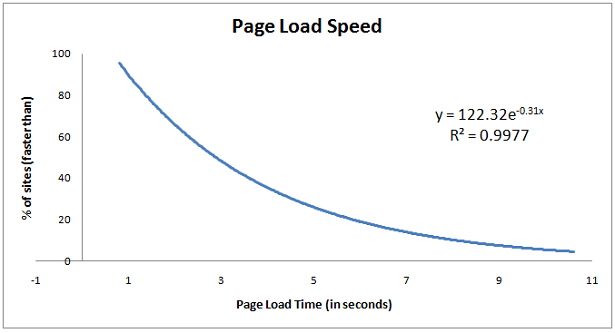Sign up to our Newsletter
It was suspected for a long time, but when Google confirmed that website speed is one of many factors that influences their ranking algorithms, business owners should have no doubt wheter to increase their website speed. To quote Google (and their excellent page about philosophy):
How One AI-Driven Media Platform Cut EBS Costs for AWS ASGs by 48%

Fast is better than slow.
We know your time is valuable, so when you’re seeking an answer on the web you want it right away–and we aim to please. We may be the only people in the world who can say our goal is to have people leave our website as quickly as possible. By shaving excess bits and bytes from our pages and increasing the efficiency of our serving environment, we’ve broken our own speed records many times over, so that the average response time on a search result is a fraction of a second.
How website speed influences rankings?
Google confirmed that website speed influences some 1% of the search queries, but given the big competitiveness for specific keywords and other ranking factors, when all else is similar or equal, website speed should come as a factor in rankings. Furthermore, website speed influences bounce rates of your visitors, alongside with other website metrics (time on site, average pageviews, exit rates) so it may influence other “soft” ranking factors that Google doesn’t eagerly promote (like links, relevancy, domain authority).
In 2011, on SEOMoz we saw this post where yet another calculation of speed is done by Geoff Kenyon where he reverse engineered the equation:
y = 122.32e-0.31x
In this equation, x is the time it takes your page to load (in seconds) and the result, y is approximately the percent of pages that your page is faster than.
As a result, Geoff approximated the speed of page load and compared it to other sites. The results are:
- If your site loads in 5 seconds it is faster than approximately 25% of the web
- If your site loads in 2.9 seconds it is faster than approximately 50% of the web
- If your site loads in 1.7 seconds it is faster than approximately 75% of the web
- If your site loads in 0.8 seconds it is faster than approximately 94% of the web
Distilled provided this spreadsheet to calculate the comparison.
How to determine your website speed compared to your competitors (and get the rankings)
- Go to Google Analytics and grab your best performing or most important keywords (in terms of traffic and conversions)
Pick your keywords carefully. Look for the keywords that have the most impact on your brand, your revenue (especially if you are ecommerce site where you can calculate your per-keyword revenue) and your traffic. You can also look for the keywords that impact your other metrics – such as bounce rates, time on site, newsletter signups. If you are not sure what to look for – visit Avinash Kaushik’s site and look for some excellent posts on Google Analytics. If you don’t have enough data (because some of the keywords are (not provided) in Google Analytics) use Google Webmaster Central to see the search queries you rank for. - Use some of the ranking tools to determine where you stand against your competitors.
There are numerous ranking tools out there – you can check out RankChecker for Firefox, SEOMoz RankTracker, Link Assistant, CuteRank, Advanced Web Rankingand many more. Have in mind that the search results are constantly getting more personalized (with the introduction of Google+), that Google constantly re-ranks the results, that the results vary by geolocation and language and so on. - Write down your competitors
Even with the SERPs ranking getting more and more difficult to track, you will get the idea who your competitors are. Even if they are not in the rankings, you should write down the names of those you already know.
- Use website speed tools to determine how your website speed compares to your competitors
We’ve written a lot about website speed tools so you can check out more comprehensive listthan few we list here: Pingdom, Google Page Speed, YSlow. Create a list to determine how you compare to your competitors and where you can improve. - Define your performance strategy & improve your website / application speed
If you have a big website with many pages, categories and deep structure, it may be difficult for you to change it or optimize it immediately. What is important to understand is that you need to look at the low-hanging fruit in your overall performance optimization strategy. For some business owners, improving onsite optimization, caching and HTML/CSS/JavaScript optimization may be easier than others who need to look for hardware performance optimization first. In short, you should look to optimize both onsite optimization and include performance optimization throug CDN, dynamic acceleration or mobile acceleration.
If you are not familiar with the concepts and need help to boost your website performance (and consequently your rankings), you can always ask our team to help you get started. We are specialized in improving performance of almost any kind of online business with global or regional presence.
Improving your website speed is of paramount importance to your online business and to your bottom line, regardless of the benefits to search engine rankings. To quote Matt Cutts:
So speeding up your website isn’t just something that can affect your search rankings–it’s a fantastic idea for your users.









